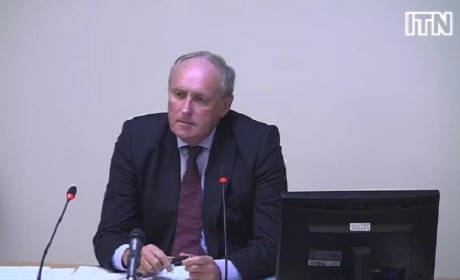You may recall that back in April Nick Davies gave evidence to the House of Commons Culture, Media and Sport select committee, for its review into press standards, privacy and libel.
In the course of that session he claimed there was ‘a real will on the part of the PCC [Press Complaints Commission] to avoid uncovering the truth about phone hacking’ and that newspapers still used private investigators: “It is wrong but they are not doing anything about it and that continues despite Motorman [investigation undertaken by the Information Commissioner’s Office into alleged offences under data protection legislation.] All that has happened is that they have got a little bit more careful about it. I actually got to know that network of private investigators who were exposed in Motorman. Years after that I was in the office of one of them and he was taking phone calls from newspapers while I was there.”
The committee chairman, John Whittingdale, said: “We did do an investigation both into Motorman and into Goodman so I do not want to revisit old ground too much”.
The same committee which today announced it will open a new inquiry ‘into the Guardian revelations about the use of illegal surveillance techniques by News International newspapers’ (Guardian.co.uk).
Yesterday Nick Davies’ Guardian exclusive – which reported Murdoch papers paid £1m to silence victims of phone hacking – alleged that the evidence posed difficult questions for the PCC: it has ‘claimed to have conducted an investigation, but failed to uncover any evidence of illegal activity,’ it was reported.
Davies is no friend of the Press Complaints Commission – as reported on Journalism.co.uk before – and used his appearance in front of the committee in April to argue that the ‘PCC’s performance is so weak that it threatens the concept of self-regulation.’
The PCC has stated today, in light of the new reports, that ‘any suggestion that further transgressions have occurred since its report was published in 2007 will be investigated without delay.’
Now, let’s look back at Davies’ comments in the Commons in April (from uncorrected evidence on House of Commons site). Davies laid the bait for us all, but it would seem only he pursued his allegations against News of the World, to secure yesterday’s scoop:
Mr Davies: It is that word that Roy [Greenslade] has just used that is the important one, their independence. They [PCC] are not sufficiently independent to do their job properly; they are not functioning as an independent referee. You could see it, for example, in the way they handled the Clive Goodwin [sic] story. There are newspapers publishing stories all over Fleet Street; there is a whole lot of hacking going on, hacking into mobile phones. They conducted an inquiry which was set up in such a way that it could not possibly disclose the truth about that illegal activity. Why? Why did they not conduct a proper, independent inquiry? It was the same with the information commissioner after Operation Motorman. We used the Freedom of Information Act on the information commissioner and got hold if the e-mails and letters between the commissioner and the Press Complaints Commission. You can see there the information commissioner saying, “Look, we have just busted this private eye. It is horrifying what newspapers are doing. Will you put out a clear warning to these journalists that they must obey the law?” The short answer was, “No, not if we can help it”. You may be familiar with all this —–
Q435 Chairman: We had an inquiry into Motorman.
Mr Davies: Did you have the e-mails and so on?
Q436 Chairman: We had representatives of News International and so on.
(…)
Mr Davies: Also, when he [Paul Dacre] goes into hospital to have operations on his heart, there is always a message sent round Fleet Street saying, “Mr Dacre’s in hospital, please do not report it”. Medical records are supposed to be plundered by Harry Hack with beer on his breath and egg on his tie. It is wrong but they are not doing anything about it and that continues despite Motorman. All that has happened is that they have got a little bit more careful about it. I actually got to know that network of private investigators who were exposed in Motorman. Years after that I was in the office of one of them and he was taking phone calls from newspapers while I was there. It has not stopped; it has just got a bit more careful. It had got so casual that every reporter in the newsroom was allowed to ring up and commission illegal access to confidential information, now they have pulled it back so that you have to get the news editor to do it or the news desk’s permission. It is still going on and it is against the law.
Q446 Paul Farrelly: Do you think the PCC missed a trick with its own standing reputation in not summoning Mr Coulson?
Mr Greenslade: I wrote at the time and have maintained ever since that the Goodman affair was a very, very black moment in the history of the PCC. This man was jailed for breaking the law. His editor immediately resigned but there were huge questions to ask about the culture of the News of the World newsroom which only the man in charge of that newsroom could answer. When I challenged the PCC about why they had failed to call Mr Coulson they said that he was no longer a member of the press. That seems to me to be a complete abnegation of the responsibilities of the PCC for the public good. In other words, to use a phrase Nick has already used, it was getting off with a technicality.
Mr Davies: If you say to Coulson, “Come and give evidence even though you are no longer an editor” and if he says, “No” then that is an interesting tactical failure on his part. It is not just the editor of the paper; what about the managing editor? Why not call Stuart Kuttner, the managing editor of the News of the World, who has been there for years and who has a special responsibility for contracts and money? Why not call him to give evidence? There was a real will on the part of the PCC to avoid uncovering the truth about phone hacking.
Q447 Chairman: We did do an investigation both into Motorman and into Goodman so I do not want to revisit old ground too much.
Mr Davies: It is what it tells you about the PCC.


